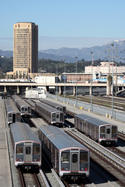It is an old saying, but true as ever: “Time is money.” A company that can produce quality products in less time than its competitors is likely to be more profitable and productive. An urban area where employees travel less time to get to work is likely to be more productive than one where travel times are longer, all things being equal. Productivity is a principal aim of economic policy. Productivity means greater economic growth, greater job creation and less poverty. read more »
Transportation
Smart Growth Must Not Ignore Drivers
For the time being, battles over health care and energy seem likely to occupy the attention of both the Obama administration and its critics. Yet although now barely on the radar, there may be another, equally critical conflict developing over how Americans live and travel.
Right now this potential flash point has been relegated to the back burner, as Congress is likely to put any major transportation spending initiative on hold for at least a year, and perhaps longer. This also may be a symptom of mounting concerns over the deficit. Financing major changes in transportation, for example, would probably require higher federal fuel taxes, which would not fly amid a weak economy. read more »
Amtrak Runs Off The Rails
When the United States was in the money, the Congress grudgingly voted Amtrak a $1 billion subsidy every year, and then engaged in histrionics about how it might be cheaper to send most passengers to their destinations on private jets.
Then oil went to $140 a barrel, the United States dropped into recession, and one of the answers was to vote $12.9 billion in stimulus money, over the next five years, to Amtrak, the railroads, and state-supported transportation agencies. read more »
Beijing is China's Opportunity City
“What the Western fantasy of a China undergoing identity erasure reveals is a deep identity crisis within the Western world when confronted by this huge, closed, red alien rising. There is a sense that world order is sliding away from what has been, since the outset of industrialization, an essentially Anglo-Saxon hegemony, and a terrible anxiety gathers as it goes.” – Adrian Hornsby, “The Chinese Dream: A Society Under Construction”. read more »
Taking the Fun Out of Fighting Global Warming
It is a rare spectacle when broadly respected national organizations and analysts condemn an initiative by some of the most influential players in the Washington establishment. Yet that is exactly what has happened to the Moving Cooler report, authored by the consulting firm Cambridge Systematics, published by the Urban Land Institute and sponsored by the American Public Transportation Association (APTA), the Environmental Defense Fund, Natural Resources Defense Council, the Environmental Protection Agency and others. read more »
Playing with the Big Boys: The Costs of Fruitless Passenger Rail Tours
In these hard times the New Zealand public is somewhat excited about the travel costs incurred by our Government Ministers and MPs. Overseas travel attracts particular rage and fury.
A particularly galling example is a proposal by Christchurch City Mayor Bob Parker, his CEO Tony Marryat, and an urban planner, to visit the US to investigate the performance of light rail in Los Angeles, San Francisco Bay Area, Seattle and Vancouver. read more »
Vetting the Volt: Toward Meaningful Electric Car Fuel Consumption Ratings
The 230 Miles per Gallon Claim: The General Motors (GM) announcement last week that the Chevrolet Volt would achieve 230 miles per gallon in city driving and a rating of more than 100 miles per gallon with combined city and highway driving sadly contains more hype than reality. The Chevrolet Volt is a plug-in hybrid vehicle that GM intends to begin marketing in 2010. GM has indicated that the car will be able without gasoline for 40 miles, on its rechargeable battery. After the battery is depleted, the car would begin to use gasoline. The 230 mile per gallon figure, according to GM, was calculated using a proposed but yet not revealed Environmental Protection Agency fuel economy testing procedure. Similarly, the details of the GM calculation were not revealed. read more »
Immigrants Are ‘Greening’ our Cities, How About Giving them a Break?
Debate about immigration and the more than 38 million foreign born residents who have arrived since 1980 has become something of a national pastime. Although the positive impact of this population on the economy has been questioned in many quarters, self-employment and new labor growth statistics illustrate the increasingly important role immigrants play in our national economy. read more »
- Login to post comments
One Step for Short-term Economic Stimulus, and One Giant Leap (backward) for U.S. Energy Sustainability
The “cash for clunkers” (or CARS) program that was widely predicted to be extended by the Congress has been, if nothing else, a clear public relations win for the Obama Administration. It may also be, at least for the short-term, a shot in the arm for the beleaguered American auto industry (including domestic dealerships of foreign car companies, like Honda and Toyota). But the program’s extension may also be bad news for anyone who was hoping that candidate Obama’s campaign promises to fix our domestic energy policy would translate into something resembling a robust make-over. read more »
Reducing Vehicle Miles Traveled Produces Meager Greenhouse Gas Emission Reduction Returns
Senators Jay Rockefeller (D-West Virginia) and Frank Lautenberg (D-New Jersey) have introduced legislation that would require annual per capita reductions in driving each year. Another bill, the National Transportation Objectives Act, introduced by Representative Rush Holt (D-Indiana), Representative Russ Carnahan (D-Missouri) and Representative Jay Inslee (D-Washington.) would require a 16 percent reduction in driving in 20 years. read more »






















